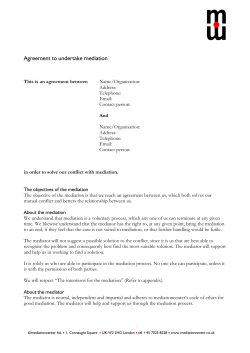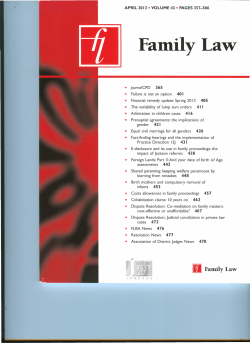
International Journal of Business and Management Invention
International Journal of Business and Management Invention ISSN (Online): 2319 – 8028, ISSN (Print): 2319 – 801X www.ijbmi.org Volume 2 Issue 1 ǁ January. 2013ǁ PP.40-43 Legal Enforceability of ADR Agreement Md. Zahidul Islam LL.B (EU), MCL (IIUM), Postgraduate Student, Ahmad Ibrahim Kulliyyah of Laws, International Islamic University Malaysia Contract address: Room no.2.6, PG Block, Mahallah Salauddin Al-Ayyubi, International Islamic University Malaysia ABSTRACT: There has been strong growth in Alternative Dispute Resolution (ADR) in recent year. The issue of legal enforceability of ADR agreement has supported by many judgments of UK and Australia. In this article ADR processes means negotiation, mediation or conciliation, mini trial and expert determination. In this article, arbitration is not including as ADR processes because presently arbitration statutory provisions exist in nearly every country to ensure legal enforcement of arbitration agreement. This article draws out the circumstances in which the courts are likely to uphold the enforceability of ADR clauses in agreements. It is qualitative research. I use secondary sources. Keywords––Legal Enforceability, Alternative Dispute Resolution, ADR Processes, Conciliation and Mediation. I. INTRODUCTION What is ADR? Put very simple, ADR is when there is a conflict between two people or among people or between institutions, they, themselves, should be able to negotiate their difference with a view to achieving an equitable settlement and they, themselves, should ensure its enforcement through mutual agreement. In this article ADR processes means negotiation, mediation or conciliation, mini trial and expert determination. In this article, arbitration is not including as ADR processes because presently statutory provisions exist in nearly every country to ensure legal enforcement of arbitration agreement.1 Moreover, legal enforceability of ADR processes have been supported by some judgment but it is still debatable. II. THE POSITION UNDER ENGLISH COURT Hillas & Co. v. Arcos Ltd.2 in this case Lord Wright expressed his approval of enforceability, that „there is … no bargain except to negotiate, and negotiation may be fruitless and end without any contract ensuring yet even then, in strict theory, there is a contract to negotiate.‟ These works kindled a glimmer of hope for the enforcement of the negotiation agreements.3 Wolford v Miles4 case was concerning the sale of a photographic processing business, and the central issue were the enforceability of a contract to negotiate and the term of a „Lock out‟ agreement (i.e. an agreement not to negotiate with any other parties whilst negotiation were continuing with one party). Subsequently, the vendors withdrew from negotiations and decided to sell to a third party. The proposed purchasers brought an action against the vendors for breach of a „lock out‟ agreement. That so long as the vendors continued to desired to sell; the vendors would continue to negotiate with good faith with the proposed purchasers. On appeal, the Court of Appeal, held that the alleged collateral agreement was no more than an agreement to negotiate and was therefore unenforceable. On further appeal, the House of Lords held that a „lock out‟ agreement, whereby one party for good consideration agreed for a limited specific time not to negotiate with anyone except the other party, could constitute an enforceable agreement. Pitt v PHH Asset Management5 in this case the Court said it clear that the verdict in Walford will not apply in such cases where the lock out agreement allows negotiations to go on and on over an indefinite period of time. 1 Gary B. Born, International Commercial Arbitration vol.1, 1004-1005 (1st ed. 2009). Hillas & Co. v Arcos Ltd, 38 Com. Case no. 23(1932). 3 Mohammad Naqib Ishan Jan et al., Mediation in Malaysia: The Law and Practice 114 (1st ed. 2010). 4 Walford v Miles, 1 All ER 453,453-455 (1992). 5 Pitt v PHH Asst Management, 4 All ER 961,966-968 (1993). 2 www.ijbmi.org 40 | P a g e Legal enforceability of adr agreement If the terms of conditions precedent are well specified, clear and un-ambiguous, then it may be possible to order enforcement of the ADR agreement during a specified time on the basis on the well-known Scott v Avery6 rule in which it is agreed that the jurisdiction of the courts can be ousted to enforce an ADR agreement during a specified time,7 disallowing either party to take the dispute to a court during this time frame. By doing so, the parties may provide an opportunity to the court to indirectly order enforcement of an ADR agreement during the specified time agreed upon by the parties. 8 Courtney & Fairbain Ltd. V Tolaini Bros. (Hotels) Ltd.9 in this case Lord Denning said that: If the law does not recognize a contract to enter into a contract, it seems to me it cannot recognize a contract to negotiate….It seems to me that a contract to negotiate, like a contract to enter into a contract, is not a contract known to the law…I think we must apply the general principle that when there is a fundamental matter left undecided and to the subject of negotiation. 10 Cott Uk Ltd v Barber Ltd11 is a landmark judgment in which enforceability of an ADR process was given recognition through the stay of legal proceeding involving the dispute which was to be referred to an ADR process other than arbitration but it was bought before a court for adjudication. After that, came Halifax Financial Services Ltd v Intuitive System Ltd 12 in which a line of distinction was drawn between binding and non-binding forms of ADR processes for purposes of enforcement of ADR agreements. 13 Nowadays, courts have statutory powers to stay proceedings brought in breach of an arbitration clause. 14 Section 9 of the Arbitration Act 1996 (UK) says: A party to an arbitration agreement against whom legal proceeding are brought in respect of a matter which under the agreement is to be referred to arbitration may, upon notice to the other party to the proceeding, apply to the court in which the proceeding have been brought to stay the proceeding so far as they concern that matter. An application may be made notwithstanding that the matter is to be referred to arbitration only after the exhaustion of other dispute resolution procedures. Another statutory provision which indirectly helps in the enforcement of an ADR agreement is part 44.5 of the Civil Procedure Rules 1999 (UK) which provides the imposition of cost sanctions on a rouge party which runs to the court before fulfilling the pre-agreed agreement to ADR. Such a conduct is taken to amount to pre-issue unreasonable conduct that is failure to try ADR first without having a good reason to justify such conduct.15 III. THE POSITION UNDER AUSTRALIAN COURT Hooper Bailie Associated Ltd v Natcon Group Pty Ltd 16 in this case Hooper bailie sought a stay of arbitration proceeding alleging that there was a binding agreement to conciliate and the arbitration would not resume until the conciliation had concluded.17 It further contended that it was an implied term of that agreement that the parties “would take all reasonable steps to endeavour to resolve the conciliation issue under the chairmanship of [the conciliator] by discussion consideration, and agreement. Giles J, in ordering a stay of the arbitration proceedings, concluded that the parties had agreed to conciliation and had also agreed the arbitration would not resume until the conciliation had been concluded. While his Honour noted that in England the courts had held that the concept of a duty to carry on negotiation in good faith was inherently repugnant to the adversarial position of the parties when involved in negotiations he drew support for the enforceability of such agreements in Australia from the decision of Coal Cliff Collieries Pty Ltd v Sijahama Pty Ltd.18 In that case, 6 Scott v Avery, 10 ER 1121 (1865). Henry Brown & Arthur Marriott, ADR Principles and Practice 598 (3 rd.ed 2011). 8 Mohammad Naqib Ishan jan et al., Mediation in Malaysia: The Law and Practice 116 (1st ed. 2010). 9 Courtney &Fairbain Ltd. v Tolaini Bros.(Hotels) Ltd, 1 All ER 716, 718-720 (1975). 10 Laurence Boulle et al., mediation principles process practice, 472 (2001); Syed Khalid Rashid, Mediation in Malaysia: The Law and Practice 115 Mohammad Naqib Ishan jan et al., LexisNexis (1st ed. 2010). 11 Cott Uk Ltd v Barber Ltd, 3 All ER 540 (1997). 12 Halifax Financial Services Ltd v Intuitive System Ltd, 1 All ER (Comm) 303 (1999). 13 Mohammad Naqib Ishan jan et al., Mediation in Malaysia: The Law and Practice 114 (1st ed. 2010). 14 Laurence Boulle et al., mediation principles process practice, 477 (1st ed. 2001). 15 Mohammad Naqib Ishan jan et al., Mediation in Malaysia: The Law and Practice 114 (1st ed. 2010). 16 Hooper Bailie Associated Ltd v Natcon Group Pty Ltd, 28 NSWLR 194 (1992). 17 Laurence Boulle et al., mediation principles process practice, 472 (1st ed. 2001). 18 Coal Cliff Collieries Pty Ltd v Sijahama Pty Ltd, 24 NSWLR 1(1991). 7 www.ijbmi.org 41 | P a g e Legal enforceability of adr agreement Kirby P, with whom Waddell AJA agreed, considered that a contract to negotiate in good faith was known to the law and that in some circumstances would be enforceable. 19 The issue of the enforceability of dispute resolution clauses once again came for determination before Giles J in Elizabeth Bay Developments Pty Ltd v Boral Building Service Pty Ltd.20 In the mediation agreement under consideration there was an express agreement that “each party confirms that it enters into this mediation with a comment to attempt in good faith to negotiate towards achieving a settlement of the dispute”. 21 Giles J noted that both parties took, as their standing point, that an agreement to mediate might be indirectly enforce in the manner discussed in Hooper Bailie v Natcon, if it required of the parties participation in process of conduct of sufficient certainty for legal recognition of the agreement. 22 In Aiton Australia Pty Ltd v Transfield Pty Ltd 23 parties agreed to go through „good faith‟ negotiations, mediation and expert determination. The court allowed the enforcement of this agreement which involved as could be seen both binding and non binding ADR processes and held that parties ought to be bound by the contract they negotiated freely. In these cases Einstein J suggests that the notion of good faith is implicit in any dispute resolution process. According to him the core contents of an obligation to negotiate or mediate in good faith are: (1)To undertake to subject oneself to the process of negotiation or mediation; (2) To undertake to subjecting oneself to that process, to have an open mind in the sense of: (a) a willingness to consider such option for the resolution of the dispute as may be propounded by the opposing party or by the mediator, as appropriate; and (b) a willingness to give consideration to putting forward options for the resolution of the dispute. Subject only to these undertakings, the obligation of a party who contracts to negotiate or mediate in good faith, do not obliged nor require the party: (a) to act for or on behalf of or in the interests of the other party; (b) to act otherwise than by having regard to self-interest.24 The liberal judicial attitude towards the enforceability issue influenced the enactment of certain laws which allows courts to refer cases to mediation in certain situations. For example, section 110k of the Supreme Court Act 1970 (NSW) is allowed by the Supreme Court Amendment (Referral of Proceedings) Act 2000 to refer disputes, even without the consent of the parties, to mediation and neutral evaluation: it is done in the firm belief that mandatory ADR processes may do no harm to the parties. In many situations, doing so may result into the resolution of a narrowing down of the issues. Mandatory ADR does not mean that parties are forced to arrive at a settlement. Parties do still have the power to settle. 25 Importance of legal enforceability of ADR agreement: Lawsuits are expensive. Legal victories are sometimes hollow because the cost to both sides of trying the case can exceed the amount of the judgment. Because of the high cost, litigation is increasingly being viewed as justifiable only for Long Corporation and only when there is a significant amount in dispute. There are legal fees, filing fees, and cost that can be awarded against the losing disputant (in jurisdictions where costs are awarded). It is not unusual for litigation to cost each disputant £50,000 and it is not unusual for it cost each side over £100,000 in complex cases.26 As previously stated, ADR processes are usually designed to start and finish in one day. Fees for the mediator rang from zero (volunteer mediator) to about £10,000 per day for the most expensive mediators. Half-day mediations are not uncommon. The disputants usually share the cost the mediator. The total cost of the mediation, even if there is no settlement, therefore usually pales in comparison to the cost of litigation.27 The wheels of Justice grind slowly. It takes a long time from the commencement of a lawsuit until judgment. While the length of the litigation process varies from jurisdiction, for significant cases it is rare for a 19 Patrick Mead, ADR Agreements: Good Faith and Enforceability, 10 Australian Dispute Resolution Journal, 41(1999). 20 Elizabeth Bay Developments Pty Ltd v Boral Building Service Pty Ltd, 36 NSWLR 709 (1995). 21 David Spencer & Michael Brogan, Mediation Law and Practice, 420 (1st ed. 2006). 22 Patrick Mead, ADR Agreements: Good Faith and Enforceability, 10 Australian Dispute Resolution Journal, 41(1999); Laurence Boulle et al., mediation principles process practice, 472 (1st ed. 2001). 23 Aiton Australia Pty Ltd V Transfield Pty Ltd, NSWSC 996 [1999]. 24 Mohammad Naqib Ishan jan et al., Mediation in Malaysia: The Law and Practice 119 (1st ed. 2010). 25 See id. at p.120. 26 Allan j stitt, mediation: a practical guide, 9 (1st ed.2004). 27 Id. www.ijbmi.org 42 | P a g e Legal enforceability of adr agreement case to be heard in less than a year and not at all uncommon for three years to elapse between the time of the commencement of the lawsuit and the judgment at trial. Even after the trial, the process may not be over. The losing disputant may appeal and it may be a year (or even more) before a final decision in handed down on appeal. During the appeal there will, of course, be more cost to the disputants. Over time, memories fade, and the fact that it takes a long time from the commencement of a lawsuit to judgment means that it is less likely that the truth will be determined. Also, companies that are fighting lawsuits must report on their annual reports that there is outstanding litigation, and sometimes set aside money as a contingency in case the lawsuit is lost.28 ADR processes can often be scheduled within week of a request for ADR process. While some neutral third person or mediators and some lawyers are busy and schedule may necessitate a slightly longer wait, it is unusual for disputants to have to wait more than one month or two for a mediation date. Litigation is an emotional process. It is rarely fun. People who are not used to the process (and even those who are) often find it stressful. It causes sleepless nights as litigants consider what they have said, what they should have said, what they will say, how unfair the process is, what may come out under crossexamination and the consequence of losing. People may also be concerned about the consequence of having their dispute played out on a public stage and the effect that will have on their reputations. The stress and emotional cost of litigation can translate into less focus on work and may create conflict in personal life. 29 One of the Goal of ADR process is to allow disputants to resolve their dispute while avoiding many of the stresses associated with litigation. Often the best stress reliever is early settlement of the dispute. IV. CONCLUSION In contrast to the conservative attitude of the English courts, the courts in Australia have taken a very positive stand towards the enforceability issue. Moreover, ADR processes are being practiced by many countries. This is evidenced by court annexed and now court ordered ADR processes which are becoming increasingly frequent and which recognise the value of process, which has as its aim an amicable resolution as opposed to an adversarial conquest. BIBLIOGRAPHY [1]. [2]. [3]. [4]. [5]. [6]. [7]. [8]. [9]. [10]. 28 29 Mohammad Naqib Ishan Jan &Asgor Ali Ali Mohamed, Mediation in Malaysia: The law and Practice, Malaysia: LexisNexis (1st ed. 2010). Syed Khalid Rashid & Syed Ahmad Idid, Mediation and Arbitration inAsia-Pasific, Kuala Lumpur: IIUM Press (1st ed. 2009). Allan j Stitt, Mediation: a Practical Guide, London: Cavendish Publishing Limited (1st ed. 2004). Laurence Boulle & Miryana Nesic, Mediation Principles Process Practice, London: Butterworths (1st ed. 2001). David Spencer & Michael Brogan, Mediation Law and Practice, New York: Cambridge UniversityPress (1st ed. 2006). Henry Brown & Arthur Marriott, ADR Principles and Practice, London: Sweet & Maxwell (3rd.ed. 2011). Tamara Relis, Perception in Litigation and Mediation, New York: Cambridge (1st ed. 2009). Gary B. Born, International Commercial Arbitration, Netherland: Wolters Kluwer (1st ed.2009). Karl Marsh, David Miles et al., The ADR Practice Guide Commercial Dispute Resolution, West Sussex: TottlePublishing (3rd ed. 2007). Syed Khalid Rashid, Alternative Dispute Resolution in Malaysia, Luala Lumpur: Kulliyyah of Laws,IIUM (2000). See id. at p.10 Id. www.ijbmi.org 43 | P a g e
© Copyright 2025




















